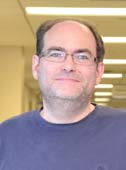Indigenous Surgery Educator Jason Pennington

Jason Pennington
|
Jason Pennington, a member
of the Huron-Wendat nation,
came to the University of
Toronto initially to study aerospace
engineering. Facilitated
by Dianne Longboat, he made
the transition to Arts & Science,
completing a Master’s in Botany
before entering Medicine in
1996 and the General Surgery
residency program in 2000. He
was active at First Nation’s House (Aboriginal Student
Support and Services @ U of T) and tutored at several
Aboriginal organizations during these formative years.
After 2 years as a Clinical Associate at Toronto Western
and locum tenens in Timmins and Kapuskasing, he
began his General Surgery practice at The Scarborough
Hospital with a focus in colorectal surgery.
Jason is an active advocate for Indigenous Health issues
at the Medial School. Lisa Richardson, an Indigenous
internist at Toronto Western and Jason are curricular leads
in Indigenous Health Education. They are based in the
Office of Indigenous Medical Education at the Medical
Sciences Building. The Office is run by Rochelle Allan,
the Indigenous Peoples’ Undergraduate Medical Education
Program Coordinator. They are primarily tasked with
introducing Indigenous health issues and concepts into
the medical school curriculum. Other roles include mentorship,
the overseeing the Indigenous applicant pathway,
supporting the resilience of Indigenous medical students,
and faculty development. For example, Jason and Lisa
were recently on the organizing committee for the Faculty
of Medicine’s Inaugural Indigenous Health Conference
focused on Health Inequities. They have also developed a
webinar for faculty tutors on interacting with Indigenous
students and cultural safety for indigenous patients. Along
with OHPSA, the office participates in a summer mentorship
program that brings Aboriginal and Black high school
students to the university. The students stay for 4 weeks on
the campus, participating in lectures and labs, job shadowing
and doing a small health-research project.
Jason’s role models encompass the values of clinical excellence,
research, leadership, education and advocacy. They
include Janet Smylie, an Indigenous researcher and Director
of Well Living House, Evan Adams, Aboriginal actor and
Deputy Minister of Health in British Columbia, and Barrie
Lavallee, a physician and advocate in Winnipeg. Jason
actively strives to emulate these mentors through many
activities. Advocacy is central to his role as the Regional
Aboriginal Cancer Lead at the Central East LIHN. He has
also participated in research with Timothy Jackson and Ori
Rotstein; they have studied the inequity of access to bariatric
surgery, and with Linda Wright investigating the role of
mentorship in heart transplantation. More remotely, under
the tutelage of Paul Grieg and Mark Cattral, he has studied
the aetiology of cirrhosis as a predictor of diabetes after liver
transplantation.
|
Some Indigenous issues such as water safety conditions,
housing, and abuses are well-known via the media.
Important Indigenous concepts are less known: the
holistic view of medicine, the world and that of cultural
safety - a concept derived from a Mauri nurse (Ramsden
I. (1990) Cultural Safety. New Zealand Nursing Journal
83 (December): 18-19). Lisa Richardson and Jason have
introduced this to the medical curriculum including
an innovative elective focused on self-reflection around
experiences with the urban Indigenous Community and
Culture. At the time of my interview, there were 8 students
clustered outside Jason’s office. They were working
on a Community Based Scholarship (CBS) project,
coordinated by Rochelle and Lisa.
“In general, Western governments approach the problems
faced by the Indigenous community with well-meant
but unhelpful interventions. The underlying problems are
related to a lack of understanding and respect for local
autonomy. This goes back to the treaties that were signed
many years ago. The belief then was that we would go
forward side by side in our canoes and boats; we would
respect each other’s needs, rights and views. Since then,
many violations have occurred. There is a tendency to
underestimate or dismiss Indigenous knowledge and overemphasize
what can be done for the indigenous people. It
leads to a paternalistic superimposition of non-Indigenous
culture, deepening the lack of autonomy.”
“There are now regular enrolments in an Indigenous
student application pathway to medical school. The
University accepts 2-3 Indigenous medical students each
year, still 1% or less of the class. There was one point in
medical school when I was the only identified Aboriginal
medical student in the four years of the medical school.
The first cohort on the pathway is graduating 2 students
this year. Both were accepted into residency programs
here at the University of Toronto. Our Indigenous students
have a lot of energy and have generally been quite
active in promoting both their culture and other talents
via multiple media. The resiliency of these young trainees
is paramount to our office to ensure the future health of
our communities and advancement of medicine overall.”
Jason is married to Winnie, a mechanical automotive
engineer. They have 3 children, Devon, age 7, and twins
Joshua and Hana, age 4. To “what are you reading these
days?” Jason answers “Goodnight Moon!”. He rarely gets
a chance to golf and is more likely to be found at t-ball
with his children.
M.M.
|